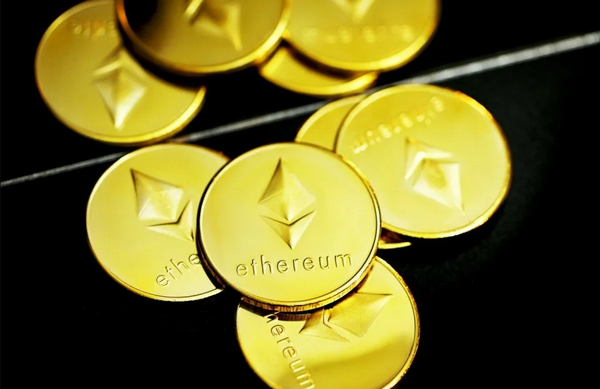-
 Bitcoin
Bitcoin $106,437.2012
0.82% -
 Ethereum
Ethereum $2,442.5287
0.82% -
 Tether USDt
Tether USDt $1.0005
-0.02% -
 XRP
XRP $2.1812
-0.27% -
 BNB
BNB $645.1327
0.45% -
 Solana
Solana $146.2379
0.39% -
 USDC
USDC $0.9999
-0.01% -
 TRON
TRON $0.2751
0.92% -
 Dogecoin
Dogecoin $0.1662
-0.23% -
 Cardano
Cardano $0.5827
-1.22% -
 Hyperliquid
Hyperliquid $37.5225
0.04% -
 Bitcoin Cash
Bitcoin Cash $479.0877
4.02% -
 Sui
Sui $2.7846
-3.27% -
 Chainlink
Chainlink $13.3576
0.84% -
 UNUS SED LEO
UNUS SED LEO $9.0252
-1.20% -
 Stellar
Stellar $0.2455
-1.07% -
 Avalanche
Avalanche $18.0680
-1.81% -
 Toncoin
Toncoin $2.8948
-1.07% -
 Shiba Inu
Shiba Inu $0.0...01164
-1.65% -
 Litecoin
Litecoin $85.0637
-0.06% -
 Hedera
Hedera $0.1526
-0.89% -
 Monero
Monero $316.2941
0.78% -
 Ethena USDe
Ethena USDe $1.0003
-0.04% -
 Polkadot
Polkadot $3.4113
-1.87% -
 Dai
Dai $1.0000
-0.01% -
 Bitget Token
Bitget Token $4.4488
5.16% -
 Uniswap
Uniswap $7.1740
3.09% -
 Pi
Pi $0.5968
11.43% -
 Pepe
Pepe $0.0...01010
-0.65% -
 Aave
Aave $264.3189
0.40%
which ethereum key is best
When choosing an Ethereum key, security, convenience, cost, and technical knowledge should be considered to determine the best option for individual needs and risk tolerance.
Oct 16, 2024 at 09:47 am

Which Ethereum Key is Best?
Ethereum is a decentralized blockchain platform that facilitates the development and execution of smart contracts—programs that run automatically when specific conditions are met. Ethereum users need a key to access their accounts and interact with the platform. Several types of Ethereum keys are available, each offering different levels of security and functionality. This article explores the various types of Ethereum keys and provides guidance on choosing the best option for your needs.
1. Software Keys (Hot Wallets)
Software keys are digital wallets stored on your computer, smartphone, or tablet. They are easy to use and provide convenient access to your Ethereum account. However, they are also less secure than hardware keys since they are vulnerable to cyberattacks and malware.
2. Hardware Keys (Cold Wallets)
Hardware keys are physical devices that store your private key offline, making them much more secure than software keys. They are typically connected to your computer or mobile device when you need to access your account. Hardware keys are more expensive than software keys but offer significantly higher security.
3. Paper Wallets
Paper wallets are physical documents containing your private key written in the form of a QR code or a human-readable string of characters. They are considered one of the most secure forms of Ethereum storage since they are not connected to a computer or the internet. However, paper wallets can be easily lost or damaged, making them less practical for everyday use.
4. Multi-Signature Keys
Multi-signature keys require the approval of multiple parties to authorize a transaction. This makes them ideal for high-value accounts and organizations where multiple individuals need to be involved in decision-making. However, multi-signature keys can be more complex to set up and manage.
5. Hierarchical Deterministic (HD) Keys
HD keys are a type of software key that generates a set of related keys from a single master seed. This allows you to create multiple Ethereum accounts and manage them all from a single master key. HD keys are convenient for managing multiple accounts simultaneously.
Choosing the Best Ethereum Key
The best Ethereum key for you depends on your specific needs and risk tolerance. Here are some factors to consider:
- Security: Hardware keys offer the highest level of security, followed by software keys, paper wallets, multi-signature keys, and HD keys.
- Convenience: Software keys are the most convenient to use, while hardware keys require you to physically connect them to your device. Paper wallets are convenient for long-term storage but less convenient for everyday use.
- Cost: Hardware keys are more expensive than software keys, paper wallets, and multi-signature keys.
- Technical Knowledge: Paper wallets and multi-signature keys can be more complex to set up and manage than software and hardware keys.
Based on these factors, here's a general recommendation:
- For everyday use, consider a software key or HD key.
- For high-value accounts or enhanced security, opt for a hardware key.
- For long-term storage, paper wallets provide a secure and stable option.
- For collaborative decision-making, multi-signature keys offer a robust and secure solution.
Disclaimer:info@kdj.com
The information provided is not trading advice. kdj.com does not assume any responsibility for any investments made based on the information provided in this article. Cryptocurrencies are highly volatile and it is highly recommended that you invest with caution after thorough research!
If you believe that the content used on this website infringes your copyright, please contact us immediately (info@kdj.com) and we will delete it promptly.
- DeFi Protocols Meet Tokenized Assets: RWA News and the Future of Finance
- 2025-06-25 21:05:12
- PEPE Price, Shiba Inu, and Angry Pepe Fork: Meme Coin Mania or Solid Investments?
- 2025-06-25 21:05:12
- South Korean Banks Eye Won-Pegged Stablecoin: A New Era for Digital Finance?
- 2025-06-25 20:45:13
- From Meme Dreams to Wealth Streams: Bonk Coin, Bitcoin Solaris, and the Future of Wealth Creation
- 2025-06-25 20:45:13
- Solana, Bitcoin, and the Crypto Crystal Ball: Price Predictions and Beyond
- 2025-06-25 21:25:12
- Pepe Coin, Crypto, and High Returns: Is Little Pepe the Next Big Thing?
- 2025-06-25 21:25:12
Related knowledge

How to customize USDT TRC20 mining fees? Flexible adjustment tutorial
Jun 13,2025 at 01:42am
Understanding USDT TRC20 Mining FeesMining fees on the TRON (TRC20) network are essential for processing transactions. Unlike Bitcoin or Ethereum, where miners directly validate transactions, TRON uses a delegated proof-of-stake (DPoS) mechanism. However, users still need to pay bandwidth and energy fees, which are collectively referred to as 'mining fe...

USDT TRC20 transaction is stuck? Solution summary
Jun 14,2025 at 11:15pm
Understanding USDT TRC20 TransactionsWhen users mention that a USDT TRC20 transaction is stuck, they typically refer to a situation where the transfer of Tether (USDT) on the TRON blockchain has not been confirmed for an extended period. This issue may arise due to various reasons such as network congestion, insufficient transaction fees, or wallet-rela...

How to cancel USDT TRC20 unconfirmed transactions? Operation guide
Jun 13,2025 at 11:01pm
Understanding USDT TRC20 Unconfirmed TransactionsWhen dealing with USDT TRC20 transactions, it’s crucial to understand what an unconfirmed transaction means. An unconfirmed transaction is one that has been broadcasted to the blockchain network but hasn’t yet been included in a block. This typically occurs due to low transaction fees or network congestio...

How to check USDT TRC20 balance? Introduction to multiple query methods
Jun 21,2025 at 02:42am
Understanding USDT TRC20 and Its ImportanceUSDT (Tether) is one of the most widely used stablecoins in the cryptocurrency market. It exists on multiple blockchain networks, including TRC20, which operates on the Tron (TRX) network. Checking your USDT TRC20 balance accurately is crucial for users who hold or transact with this asset. Whether you're sendi...

What to do if USDT TRC20 transfers are congested? Speed up trading skills
Jun 13,2025 at 09:56am
Understanding USDT TRC20 Transfer CongestionWhen transferring USDT TRC20, users may occasionally experience delays or congestion. This typically occurs due to network overload on the TRON blockchain, which hosts the TRC20 version of Tether. Unlike the ERC20 variant (which runs on Ethereum), TRC20 transactions are generally faster and cheaper, but during...

The relationship between USDT TRC20 and TRON chain: technical background analysis
Jun 12,2025 at 01:28pm
What is USDT TRC20?USDT TRC20 refers to the Tether (USDT) token issued on the TRON blockchain using the TRC-20 standard. Unlike the more commonly known ERC-20 version of USDT (which runs on Ethereum), the TRC-20 variant leverages the TRON network's infrastructure for faster and cheaper transactions. The emergence of this version came as part of Tether’s...

How to customize USDT TRC20 mining fees? Flexible adjustment tutorial
Jun 13,2025 at 01:42am
Understanding USDT TRC20 Mining FeesMining fees on the TRON (TRC20) network are essential for processing transactions. Unlike Bitcoin or Ethereum, where miners directly validate transactions, TRON uses a delegated proof-of-stake (DPoS) mechanism. However, users still need to pay bandwidth and energy fees, which are collectively referred to as 'mining fe...

USDT TRC20 transaction is stuck? Solution summary
Jun 14,2025 at 11:15pm
Understanding USDT TRC20 TransactionsWhen users mention that a USDT TRC20 transaction is stuck, they typically refer to a situation where the transfer of Tether (USDT) on the TRON blockchain has not been confirmed for an extended period. This issue may arise due to various reasons such as network congestion, insufficient transaction fees, or wallet-rela...

How to cancel USDT TRC20 unconfirmed transactions? Operation guide
Jun 13,2025 at 11:01pm
Understanding USDT TRC20 Unconfirmed TransactionsWhen dealing with USDT TRC20 transactions, it’s crucial to understand what an unconfirmed transaction means. An unconfirmed transaction is one that has been broadcasted to the blockchain network but hasn’t yet been included in a block. This typically occurs due to low transaction fees or network congestio...

How to check USDT TRC20 balance? Introduction to multiple query methods
Jun 21,2025 at 02:42am
Understanding USDT TRC20 and Its ImportanceUSDT (Tether) is one of the most widely used stablecoins in the cryptocurrency market. It exists on multiple blockchain networks, including TRC20, which operates on the Tron (TRX) network. Checking your USDT TRC20 balance accurately is crucial for users who hold or transact with this asset. Whether you're sendi...

What to do if USDT TRC20 transfers are congested? Speed up trading skills
Jun 13,2025 at 09:56am
Understanding USDT TRC20 Transfer CongestionWhen transferring USDT TRC20, users may occasionally experience delays or congestion. This typically occurs due to network overload on the TRON blockchain, which hosts the TRC20 version of Tether. Unlike the ERC20 variant (which runs on Ethereum), TRC20 transactions are generally faster and cheaper, but during...

The relationship between USDT TRC20 and TRON chain: technical background analysis
Jun 12,2025 at 01:28pm
What is USDT TRC20?USDT TRC20 refers to the Tether (USDT) token issued on the TRON blockchain using the TRC-20 standard. Unlike the more commonly known ERC-20 version of USDT (which runs on Ethereum), the TRC-20 variant leverages the TRON network's infrastructure for faster and cheaper transactions. The emergence of this version came as part of Tether’s...
See all articles
























































































